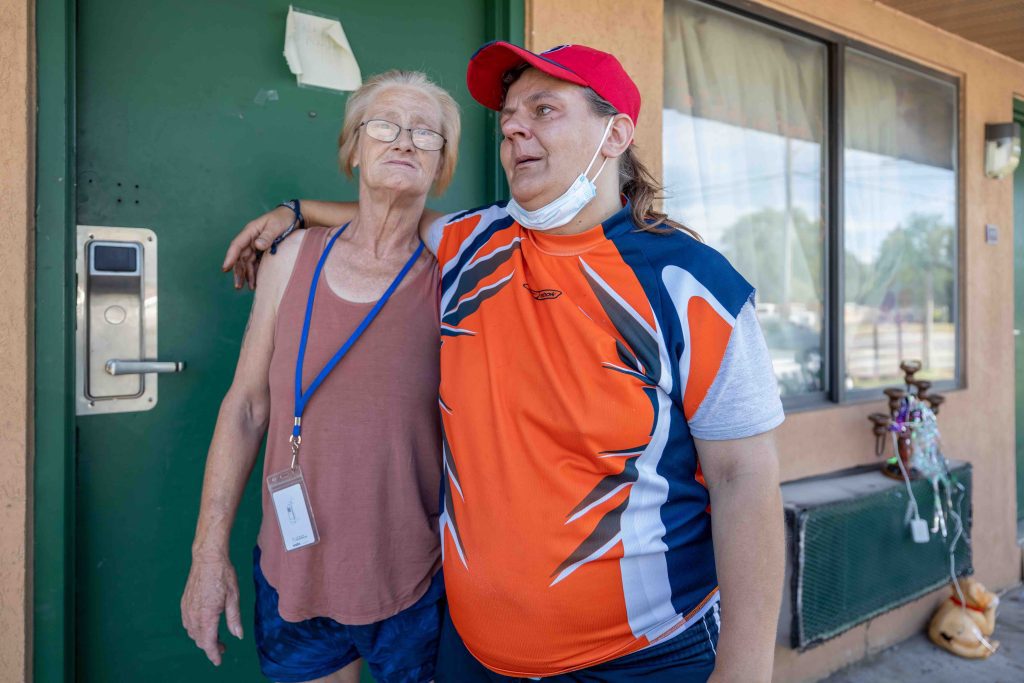
Two residents of Motels4Now hang out by one of the motel units. Photo by Myriam Nicodemus
Afternoons at Motels4Now are rarely boring.
In the parking lot outside a former Knights Inn in South Bend, Indiana, a young woman and an older man are engaged in a bitter argument. At times, the back-and-forth calms, only to loudly reconvene in one of the rooms or behind the building. The young woman, Clara (residents’ real names won’t be used here), issues a series of colorful, detailed threats and defies anyone to stop her from carrying them out. “I heard the cops are coming!” she yells. “Where are they? I ain’t afraid!”
Soon after, a city police officer does drive up, but by then Clara has left. The police officer pulls away, ignoring a young man riding his bicycle in tiny circles in the middle of the parking lot and a woman who emerges from one of the rooms every few minutes to levy rapid-fire accusations to no one in particular. A heavily bearded man takes it all in from his spot in a stained beige recliner next to thedumpster, drinking from a 25-ounce can of Hurricane High Gravity malt liquor, a small pile of empties at his feet.
Another man hurriedly walking across the parking lot is greeted by Motels4Now director Sheila McCarthy, who welcomes him back after a short jail stint for violating his probation as a sex offender. McCarthy returns to the staff office, two motel rooms with the separating wall knocked out. A diagram on the wall notes the risk levels of injecting drugs into different areas of the body. Desperation can trump discretion, though: one of the residents was recently treated for a large injection-created abscess in her neck.
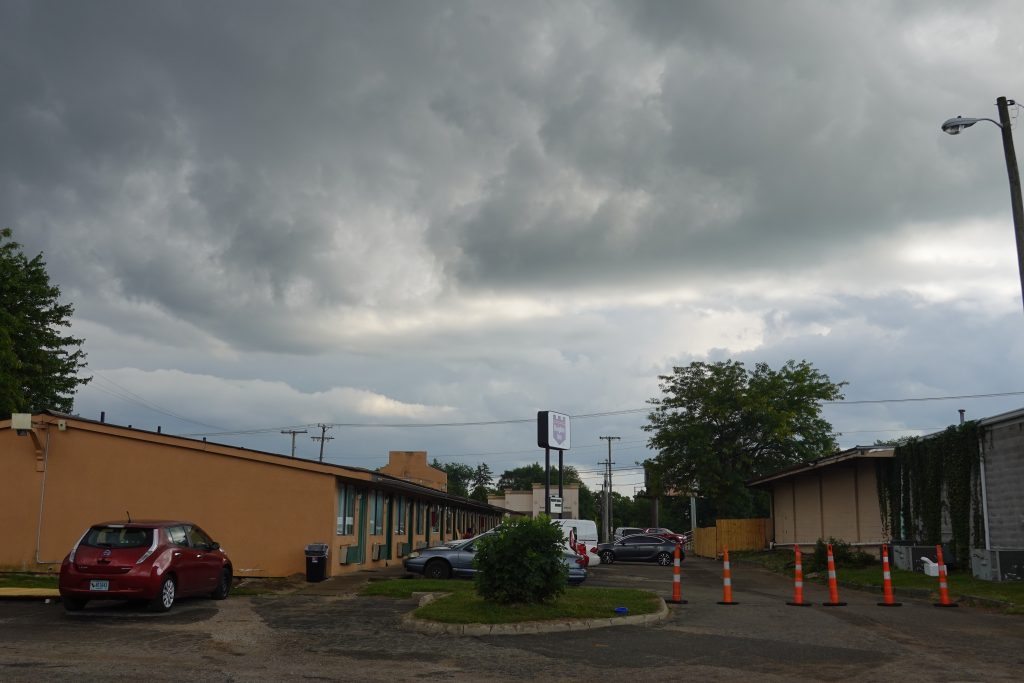
What used to be a Knights Inn is now Motels4Now, a low-barrier shelter, in South Bend, Indiana. Photo by Brandon Turk
Motels4Now is a low-barrier shelter, meaning that residents do not have to demonstrate sobriety or medication compliance to be able to stay. The staff estimates that nearly all of the 115 residents are dealing with at least one severe mental illness, often including addiction. About 80 percent have lived on the streets for a year or more, and few are able to consistently keep any employment besides occasional one-off jobs. More than half of the current residents are on their second stay here, usually because they have been asked to leave during previous stays, usually after repeated unauthorized visitors or conflicts with other residents.
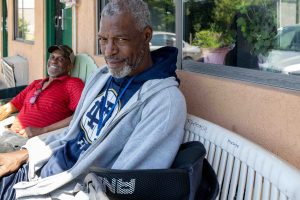
Two residents of Motels4Now pass the time of day in front of the motel. Photo by Myriam Nicodemus
The challenges are on high-volume display, but McCarthy points out some less obvious signs of success. A group of older men sit and talk in chairs they have set up on the narrow sidewalk in front of their rooms. Among them is Lawrence, who lived outdoors for 18 years before being invited to move to Motels4Now. There was an adjustment period—Lawrence at first did not want to spend the night indoors, and then he struggled to break his habit of hoarding food for weeks on end. But now he is settling in, regularly getting medical care for the first time in four decades, and enjoying the security of a locked door to protect him at night. “It is a myth that people prefer to be homeless if they have an alternative that allows them safety and respect,” McCarthy says.
Motel4Now’s most impressive success stories are no longer on site. A full three-quarters of former residents, 400 people in total, now live in stable long-term housing. Those who have not yet joined them are on the same path, McCarthy insists, even while dealing with profound challenges exacerbated by years on the streets. She points to the office wall opposite the safe injection poster where a print made by a local artist reads “Housing is Healing.” “You can see when our repeat guests come back, they are a little better each time,” McCarthy says. “It is visibly transformative for them to have a roof over their heads.”
McCarthy picks an unlikely example: Clara, the young woman who was just threatening a fellow resident. Overall, Clara’s stay was much more peaceful than her past times at Motels4Now, McCarthy says. Like all the others who have been asked to leave, Clara will be assured that she is automatically on the waiting list for a return stay, and she will be welcomed back when her name gets to the top of that list.
“It Is the Right Thing to Do Because It Works”
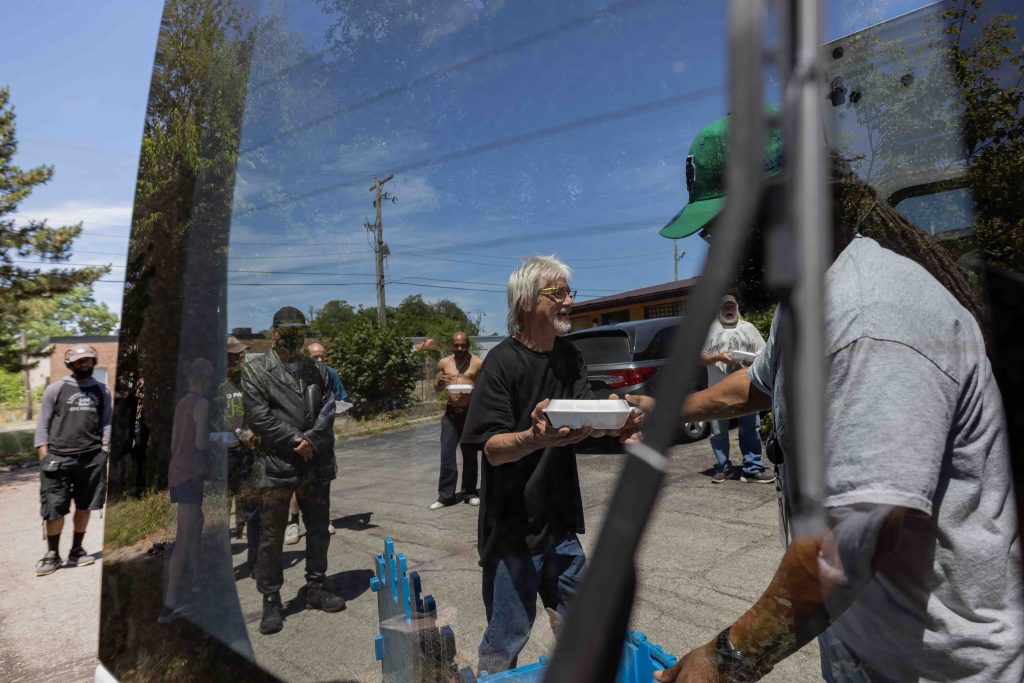
Residents of Motels4Now line up to get meals delivered by a volunteer, at right. Photo by Myriam Nicodemus
Filmmaker Don Sawyer, a longtime advocate for homeless people and director of the award-winning 2015 documentary Under the Bridge: The Criminalization of Homelessness, says Motel4Now’s unconditional commitment to providing shelter and security is the foundation of the Housing First philosophy. “The record shows conclusively that this is not just the right thing to do because it gives them dignity, it is the right thing to do because it works,” Sawyer says. “For the first time in years for some of them, people can lock their own door, put their things away, and find a little bit of calm where they can safely breathe, where they can safely think. And that usually allows them to move toward stability.”
Indeed, more than two dozen studies and high-profile success stories from Houston to Helsinki have shown that Housing First can quickly and relatively inexpensively end homelessness. Sawyer also points out that immediate shelter programs that use motels or hotels provide a far safer and more healthy response than congregate shelters. Studies from the University of Washington and the Yale School of Public Health have shown that motel shelters lead to improved health and social outcomes, thanks to the additional privacy and security they provide. “What we know of mental health and getting to a place of stability, this [motel rooms) intervention — while not perfect and not a substitute for housing — is closer to what we think might create conditions for someone to move on,” said Rachel Fyall, one of the University of Washington study’s authors, in the announcement of the study results.
As chronicled previously in Shelterforce, many motel or hotel-based programs grew out of COVID-19 pandemic necessity. Motels4Now is no exception. In the summer of 2020, South Bend’s congregate facilities that served the homeless were forced to close. Tent encampments popped up on the edge of downtown for the first time, quickly swelling to a population of more than 100 people living without access to clean water or sanitation. When some of those people developed COVID and were subsequently quarantined by city officials at local motels, it became clear that motel rooms could provide an answer to the broader need. Yet it was just as clear that some of the encampment residents struggled with mental illnesses and addictions that would prevent them from being able to comply with traditional shelter rules.
This was not news to the members of the St. Peter Claver Catholic Worker community in South Bend, founded in 2003 in the tradition of the movement created by Dorothy Day and Peter Maurin 70 years earlier. One of the first projects the Workers in South Bend created was Our Lady of the Road, which offered the homeless community a place to take showers, do laundry, eat a meal, and simply sit and rest.
Volunteers at Our Lady of the Road had known many of the tent city residents for years. Moved by the visible tent city crisis in 2020, the group’s supporters donated funds to cover the cost of additional motel rooms. Soon after, local government officials offered CARES Act dollars to rent out the entire Knights Inn by the airport if Our Lady of the Road staff would run the operation. McCarthy, who spent seven years living in the Catholic Worker community while earning her Ph.D. in theology at Notre Dame, was enlisted to lead the Motels4Now team.
During its three years of service, Motels4Now has welcomed 650 residents, with the average stay lasting about four months. Most residents live with a roommate in one of 74 rooms spread across three single-story buildings. (Roommates are adjusted frequently upon request to ensure compatibility.) Meals are provided by another local ministry, security is on-site around the clock, and community mental health providers have an office in the motel.
Housing First Matches with Religious Values
Motels4Now explicitly avoids proselytizing to its residents, and there is no “pray to stay” requirement, as some programs maintain. But there is an undeniable religious undertone to the approach.
“I could not do this work now without first spending so many years at the Worker,” McCarthy says. Her experience at the Catholic Worker community provided her with plenty of time to get to know members of the homeless community, who did their laundry and ate breakfast at Our Lady of the Road. McCarthy, who also teaches literature classes at the nearby Westville Correctional Facility, says the approach she was trained in dovetails perfectly with the low-barrier and Housing First philosophy. “The Catholic Worker teaches you to see people without judgment, to love people without attachment, and let them be who they are without projecting your disappointment onto them,” she says.
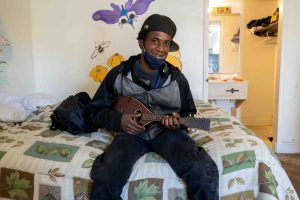
A resident of Motels4Now. Photo by Myriam Nicodemus
Eliana Armounfelder, Motels4Now’s head of housing, agrees, citing the classic Matthew 25 admonition—I was hungry and you gave me something to eat; I was thirsty and you gave me something to drink; I was a stranger and you invited me in. “A low-barrier commitment to shelter is the same as Jesus’s approach, because it was his mission to be with the people that others shun,” Armounfelder says. “When our guests have been kicked out of virtually every other setting, accompanying them is clearly what the Gospels tell us to do.”
McCarthy puts on her theologian hat to point out that that this commitment to unconditional love and service is by no means an exclusively Christian concept. The Quran mandates care for the poor and the Torah repeats the commandment to welcome the stranger no fewer than 36 times. McCarthy notes that the Hindu “namaste” greeting connotes the same divinity-in-every-person belief that animates Matthew 25.
Beyond tangible housing and support services, that philosophy manifests itself at Motels4Now in less measurable ways. The staff’s work is called accompaniment, not case management. Residents are considered honored guests and addressed as such. “Both Housing First and the Gospels have the same mandate: we give unconditional positive regard for our guests because we see Christ in them,” McCarthy says.
“We Are Not Giving Up on Them”
Of course, converted motel rooms are not the ultimate solution for the residents, as the “4Now” portion of the program’s name acknowledges. Our Lady of the Road has obtained funding from the city of South Bend and the state mental health agency to build both a new low-barrier intake center and an adjacent facility for permanent supportive housing. Until then, long-term housing for most Motels4Now residents will have to come from a combination of federal subsidies and private landlords willing to accept them.
Armounfelder’s role is to help residents search for that housing and assist with the often overwhelming logistics of applying for and retaining the government subsidy. With help, many residents are able to obtain Housing Choice Vouchers that have been set aside for people exiting homelessness , which cap their rent at 30 percent of their income with the federal government paying the rest. The subsidy is critical for a person living on a $914 monthly SSI disability check that would barely cover market-rate rent, leaving nothing for other daily needs.
But obtaining a voucher is only half the battle, as many private landlords refuse to accept tenants that rely on them. This is where Armounfelder and colleagues step in, building relationships with local landlords and promising to assist if there are ever problems with tenants who are former Motels4Now residents. Armounfelder also helps with the intimidating process of keeping the vouchers, most notably the document-intense annual recertification process with the local public housing agency. “We do not end our relationship with our guests when they move out of the motel,” she says. Nearly 80 percent of the motel residents who have moved into permanent housing have stayed there.
Teddy, the Motels4 Now resident sitting in that stained beige recliner next to the dumpster, hopes to soon join that number. With his unruly, graying beard, dirty clothes, and his speech sometimes an unintelligible mumble, Teddy spends most days walking the streets of South Bend. He fits every stereotype of a homeless person. But he is not. When Teddy relaxes with a drink after a long workday, he does so at his home—Motels4Now.
It just happens that Teddy’s workday begins when he pulls on a reflective vest and then walks up to 5 miles pushing a shopping cart he fills with aluminum cans, which he redeems for 35 cents a pound. Then his evening relaxation routine commences. “My boss gave me the rest of the day off,” he jokes from the recliner. “And he can’t fire me, because he knows that would make the whole business go under.”
Teddy has been asked to leave Motels4Now a time or two before for fighting, conflicts which he is happy to describe blow-by-blow. But he is back now, has a relative acting as the payee for his monthly disability check, and is on track to soon secure a voucher and apartment of his own. Although some Motels4Now residents arrive fresh from an eviction or a hospital or jail stay, Teddy is among the majority of current residents who are on their second, third, or even fourth stay. To some, that recidivism may seem like a failure. Not to McCarthy. “When people have been on the street for years, struggling with so many mental health and addiction challenges, the healing can take a while,” she says.
Linda too is a return resident. Very thin and with weathered skin, she looks to be in her 60s but may be younger. As for how many times she has been at Motels4Now, Linda’s best guess is three, but she is not sure. “The people here are mostly nice,” she says. Then she pauses and cocks her head to the side a bit. “Some of them get on my nerves sometimes, though, if we’re being honest.”
McCarthy hears that and smiles. Linda’s and other residents’ annoyance is often directed at the Motels4Now staff. One of Catholic Worker founder Dorothy Day’s favorite quotes comes from Dostoevsky’s The Brothers Karamazov, when a wise monk counsels a would-be do-gooder. The woman wants to serve the poor but fears that she will not receive the warm fuzzies of gratitude in return. The monk affirms her fears. “Love in action is a harsh and dreadful thing compared with love in dreams,” he says.
The analysis holds up, McCarthy says. “We are up front with our staff that you need to expect to be verbally abused sometimes,” she says. “We all just have to understand that our guests are expressing the hurt that they feel after years of people and systems letting them down, and they are transmitting that pain toward us.”
Technically, neither Linda nor Teddy—nor any other Motels4Now resident—has ever been kicked out. They are instead asked to “take a break” and, like Clara today, assured that they are automatically put on the waiting list for future openings. And they remain welcome at the affiliated Our Lady of the Road café and laundromat. “We want to assure people that we are not giving up on them,” McCarthy says.
“I Did Not Think This Was Possible”
After three years of Motels4Now’s operation, local service providers, police, and business owners all agree that South Bend’s visible homeless population has been sharply reduced. The number has dwindled so much that the Motels4Now team can identify virtually every unhoused person they see. “Most of those on the streets have been with us before and will soon be back, or they are newly homeless and they will head our way or find another option,” McCarthy says. “It is no exaggeration to say that we have ended long-term homelessness in our community.”

A resident of Motels4Now. Photo by Brandon Turk
Which, McCarthy admits, came as a surprise to her. “Starting out, I knew this was the morally right thing to do. And intellectually, I believed in the concept,” she says. “But the fact that four of every five guests we have ever had are now either safe at our motel or on to more permanent housing? I did not think it was possible that this many people could get this much better after years of dwelling in such brokenness.”
The lesson, she says, is that there is no reason the U.S. cannot join other nations, some much poorer than ours, that have all but eliminated homelessness. “Other communities and programs don’t have to do it the same way we do, of course,” she says. “But the experience here does show that this works. It can completely transform not just individual lives but a whole community.”

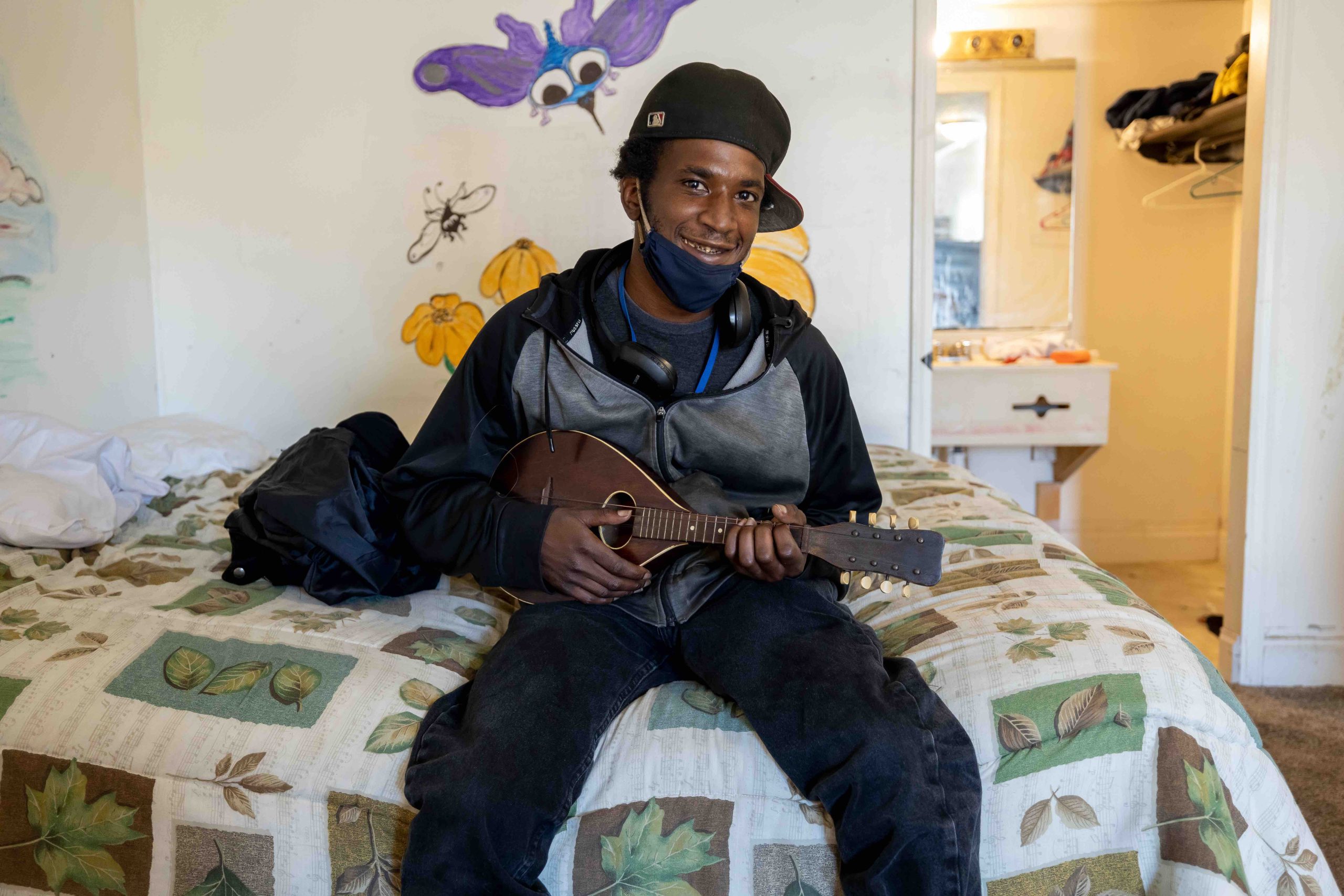

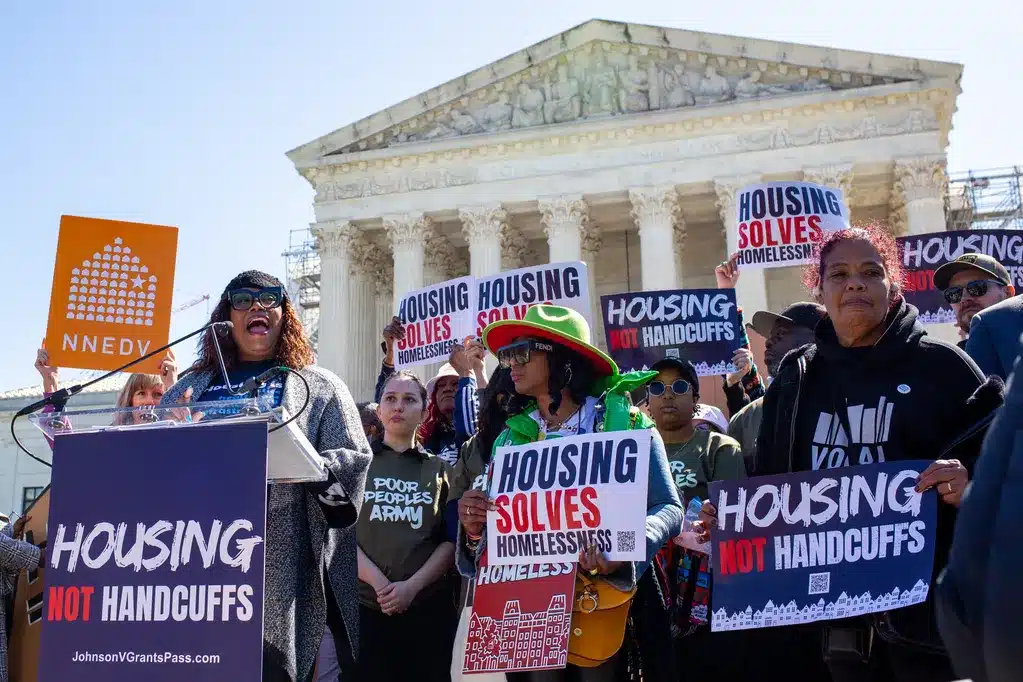


This is so inspiring, so positive. I wish I were just a little more able, I would like to be trained for this work. Thank you for this, Fran.